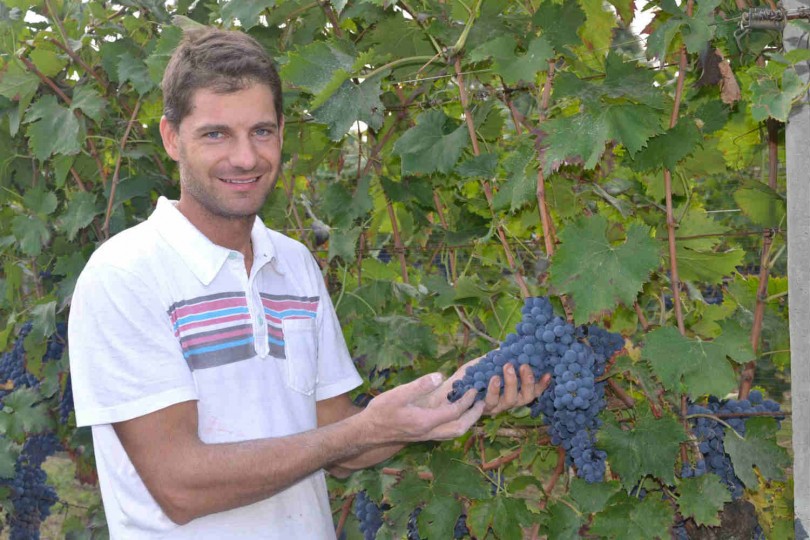The name comes from a litte tower once used for hunting, built by a priest ancestor of the family on the remains of a small medieval ruin the estates on the hills of Polpenazze, in Castelletto: this is where lies the farm Il Roccolo, a very small winery but representative of the physionomy of a territory made of realities of limited numbers, but deeply rooted in local tradition as well as more and more suited to hospitality.
The soul of Il Roccolo is Andrea Bertazzi, 38, also known as the president of the Consortium of extra virgin olive oil Garda Dop: he takes care of the family business, which has ancient roots as evidenced by the 1400 structure 1400 where the winery is located still today. In these rooms, until the post-war, the Bertazzi family also used to run the restaurant and butcher shop of the little village, activities which were coupled with the old farm primarily active in the livestock sector, as was once common in these areas. Andrea’s grandfather (he had the same name) also provided a “taxi” service with a carriage and horses, which came in handy in the 70s, at the time of Italian austerity. Andrea’s father, the late Giuseppe, has developed the wine and olive oil production, but the activity, while growing up, always remained close to family size.
The Roccolo is today a reality by five hectares of land, more or less equally divided among vineyards and olive groves. The predominant grape is obviously the native Groppello, which is at the base of the red DOC wine Garda Classico Groppello (in whose blend is also inserted a percentage of Marzemino in the order of 10-15%) and Chiaretto, prevalent varieties in deference to the most authentic character of the area. But in the range, about 9000 bottles divided into nine labels, there is also room for a treat as the Indomito, a red wine that takes its name from Andrea’s grandfather’s favorite horse, or the Rose Charmat method produced with the same grapes as Chiaretto.
In the olive grove there are about 500 plants, both secular and younger, from which in good years the company earns about 40-50 tons of olives (the local Casaliva, Leccino, Pendolino and Moraiolo the varieties represented), all recorded at disciplinary production of Garda DOP. The total annual production is about 300 bottles of an extra-virgin that reflects the classic characteristics of softness typical of the oils of this area, and that make the product suitable for example to be used as a substitute for butter in the preparation of shortbread and other sweets. Not only: in the range of Roccolo there’s also a small line of cosmetics and soap made with their olive oil.
Direct selling is the prevailing channel: the cellar is always open on weekends, all day Saturday and Sunday morning, and there are many foreign tourists who come here to stock up on “souvenirs” to take home to remember the holiday in the best way.
“Tourism on Garda represent a very important option for us – says Andrea -. We are fortunate to work in an area that continues to exert a great attraction for visitors and fans both foreigners and Italian: but that means that today the farmer must be able to turn a bit in a touristic operator, he must know how to welcome guests, by telling and explaining the reality of our territory “.
In line with this idea, Bertazzi, which otherwise has behind a bachelor’s hotel school, has obtained the license for “Family Farm”, which allows him to organize small events and evenings in the home with tasting of his wines and oil paired with other local products.
“The family context is also liked by gourmet or particularly demanding customers, who loves this type of solution especially because the basis is the human relationship: here lies the friendliness and simplicity of our way to be, which in the end is also to be found in our products.” The Roccolo is online at www.roccolobertazzi.it.
The bottle
Chiaretto and Groppello are of course the most common products, but for those looking for something particula then the pride of the winery is definitely the Indomito, produced from Marzemino, Sangiovese and Rebo grapes carried to drying in crates for about a few months after harvest, and then vinified with fermentation in steel followed by a year in oak barrels. The wine is aged a few more months in the bottle before reaching the market: there are only 1,500 bottles, almost inevitably destined for matching priority with the main dish of the area, the Spiedo alla Bresciana, although Andrea Bertazzi suggests it with the Manzo all’Olio, typical dish of the nearby Franciacorta. The 2011 production has recently sold out: 2012 was not produced, and 2013 vintage will be ready for Christmas.


Leave a Comment